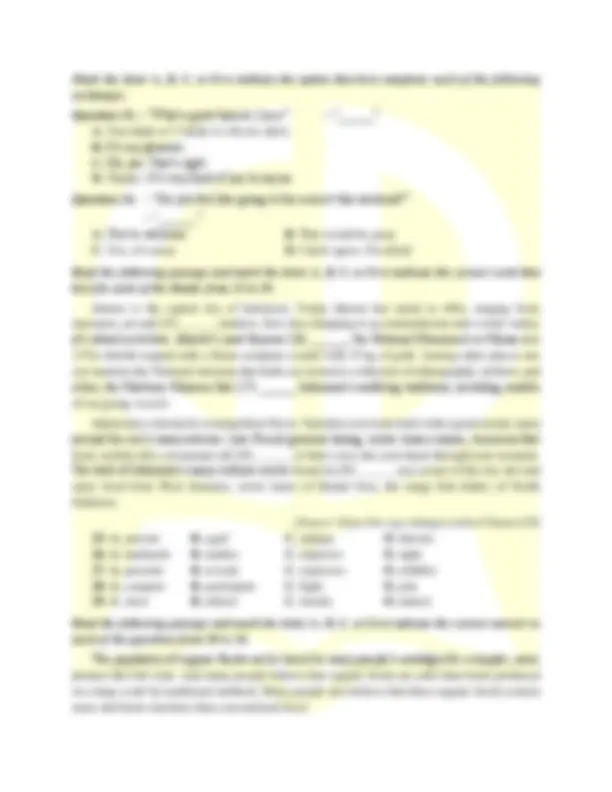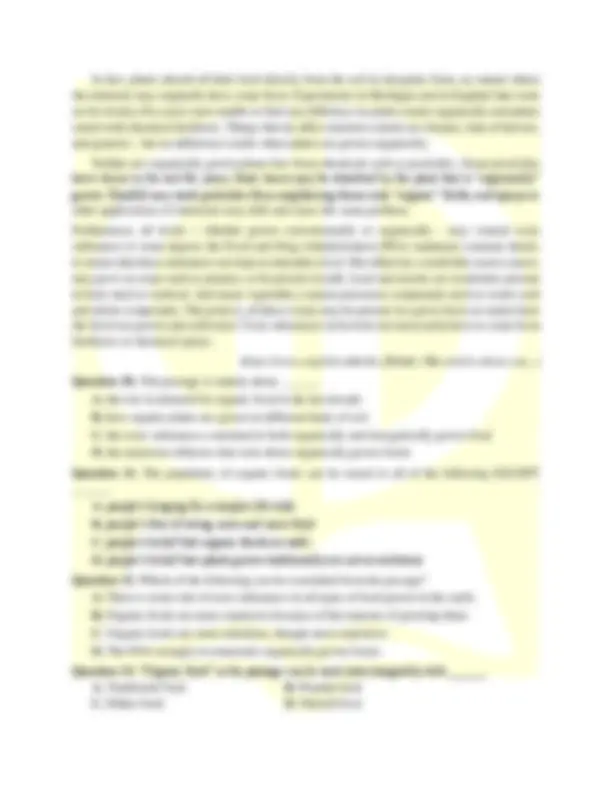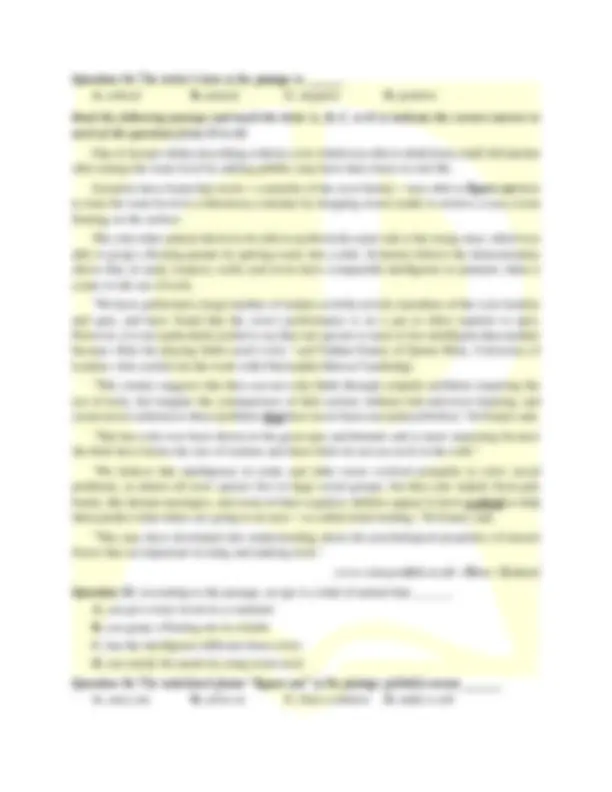





Study with the several resources on Docsity

Earn points by helping other students or get them with a premium plan


Prepare for your exams
Study with the several resources on Docsity

Earn points to download
Earn points by helping other students or get them with a premium plan
Community
Ask the community for help and clear up your study doubts
Discover the best universities in your country according to Docsity users
Free resources
Download our free guides on studying techniques, anxiety management strategies, and thesis advice from Docsity tutors
Đây là bài thi TA lớp 9, kp bài đại học
Typology: Exercises
1 / 7

This page cannot be seen from the preview
Don't miss anything!




Time allotted: 60 min. Mark the letter A, B, C, or D to indicate the word whose underlined part differs from the other three in pronunciation in each of the following questions. Question 1. A. skink B. spine C. knife D. sigh Question 2. A. affixes B. complexion C. unexpected D. exquisite Mark the letter A, B, C, or D to indicate the word that differs from the other three in the position of primary stress in each of the following questions. Question 3. A. dramatist B. improvement C. watercraft D. alcohol Question 4. A. particular B. community C. apparatus D. comparison Mark the letter A, B, C or D to indicate the correct answer to each of the following questions. Question 5. By the end of this week, we ______ on this project for more than 6 weeks. A. will work B. will be working C. will have worked D. will have been working Question 6. He said he had not discussed the matter with her. ______, he had not even contacted her. A. Furthermore B. Nevertheless C. However D. Whereas Question 7. Thanks to the extensive promotion of the book, the ______ has received many orders throughout the country. A. publish B. publishing C. publisher D. publishable Question 8. When a volcano ______, it throws out a lot of hot melted rock called lava, as well as ash and steam. A. erupts B. exposes C. exceeds D. explores Question 9. – “Will my son be all right soon, doctor?”
A. divide into B. join in C. add to D. share with Question 13. My cousin, who had been driving all day, suggested ______ at the next town. A. to stop B. stopping C. stop D. being stopped Question 14. If you often consult others, you will do everything successfully; if you ______ stubbornly ______ your own view, you will get into trouble everywhere. A. focus … on B. hold … out C. adhere … to D. replace…with Question 15. Greater effort to increase agricultural production must be made if food shortage ______ avoided. A. is to be B. can be C. will be D. has been Question 16. Similar elements in the prehistoric remains from both areas suggest that Indians and their neighbours had maintained distant but real connections ______ before 1500 BC. A. ever B. even C. never D. still Question 17. Part of Jane Colden’s work involved collecting plant specimens, cataloging plants, and ______ with other botanists. A. exchanging correspondence B. he exchange of correspondence C. correspondence exchanging D. correspondence was exchanged Question 18. The job of a demographer is to investigate ______ in specific locations. A. how people are there B. how many people are there C. how many people there are D. there are how many people Mark the letter A, B, C or D to indicate the word(s) CLOSEST in meaning to the underlined word(s) in each of the following questions. Question 19. Australian aborigines are dark skinned people whose descendants came to the continent from Asia about 25,000 years ago. A. predecessors B. relatives C. offspring D. children Question 20. Despite the fact that she is a nice person and has many good qualities, she still gets on my nerves and I find it hard to like her. A. concerns B. irritates C. admires D. examines Mark the letter A, B, C or D to indicate the word(s) OPPOSITE in meaning to the underlined word(s) in each of the following questions. Question 21. Being the second child of three, he tends to admire his elder brother and despise his younger sister. A. look up to B. make over C. make up to D. look down on Question 22. There is ample rain and intense sunlight in tropical climates; consequently, plant life is luxuriant and varied. A. detrimental B. abundant C.continuous D. little
In fact, plants absorb all their food directly from the soil in inorganic form, no matter where the nutrients may originally have come from. Experiments in Michigan and in England that went on for twenty-five years were unable to find any difference in plants raised organically and plants raised with chemical fertilizers. Things that do affect nutrient content are climate, time of harvest, and genetics - but no difference results when plants are grown organically. Neither are organically grown plants free from chemicals such as pesticides. Some pesticides leave traces in the soil for years; these traces may be absorbed by the plant that is “organically” grown. Rainfall may wash pesticides from neighboring farms onto “organic” fields, and sprays or other applications of chemicals may drift and cause the same problem. Furthermore, all foods – whether grown conventionally or organically - may contain toxic substances to some degree; the Food and Drug Administration (FDA) maintains constant checks to ensure that these substances are kept at a harmless level. But aflatoxin, a mold that causes cancer, may grow on crops such as peanuts, or be present in milk. Lead and arsenic are sometimes present in bone meal or seafood. And many vegetables contain poisonous compounds such as oxalic acid and nitrite compounds. The point is, all these toxins may be present in a given food, no matter how the food was grown and cultivated. Toxic substances in food do not necessarily have to come from fertilizers or chemical sprays. (https://www.english.com.tw › forum › the-article-about-org...) Question 30. This passage is mainly about ______. A. the rise in demand for organic food in the last decade B. how organic plants are grown in different kinds of soil C. the toxic substances contained in both organically and inorganically grown food D. the numerous fallacies that exist about organically grown foods Question 31. The popularity of organic foods can be traced to all of the following EXCEPT ______. A. people’s longing for a simpler life style B. people’s fear of eating more and more food C. people’s belief that organic foods are safer D. people’s belief that plants grown traditionally are not as nutritious Question 32. Which of the following can be concluded from the passage? A. There is some risk of toxic substances in all types of food grown in the earth. B. Organic foods are more expensive because of the expense of growing them. C. Organic foods are more nutritious, though more expensive. D. The FDA strongly recommends organically grown foods. Question 33. “Organic food” in the passage can be used interchangeably with ______. A. Traditional food B. Popular food C. Ethnic food D. Natural food
Question 34. The writer’s tone in the passage is ______. A. critical B. neutral C. negative D. positive Read the following passage and mark the letter A, B, C, or D to indicate the correct answer to each of the questions from 35 to 42. One of Aesop's fables describing a thirsty crow which was able to drink from a half-full pitcher after raising the water level by adding pebbles may have had a basis in real life. Scientists have found that rooks – a member of the crow family – were able to figure out how to raise the water level in a laboratory container by dropping stones inside to retrieve a tasty worm floating on the surface. The only other animal shown to be able to perform the same task is the orang-utan, which was able to grasp a floating peanut by spitting water into a tube. Scientists believe the demonstration shows that, in many respects, rooks and crows have comparable intelligence to primates when it comes to the use of tools. "We have performed a large number of studies on both corvids (members of the crow family) and apes, and have found that the crow's performance is on a par or often superior to apes. However, it is not particularly useful to say that one species is more or less intelligent than another because often the playing fields aren't even," said Nathan Emery of Queen Mary, University of London, who carried out the work with Christopher Bird at Cambridge. "This (study) suggests that they can not only think through complex problems requiring the use of tools, but imagine the consequences of their actions without trial-and-error learning, and create novel solutions to these problems that have never been encountered before," Dr Emery said. "This has only ever been shown in the great apes and humans and is more surprising because the birds have brains the size of walnuts and these birds do not use tools in the wild." "We believe that intelligence in rooks and other crows evolved primarily to solve social problems, as almost all crow species live in large social groups, but they also mainly form pair bonds, like human marriages, and some of their cognitive abilities appear to have evolved to help them predict what others are going to do next – so-called mind reading," Dr Emery said. "This may have developed into understanding about the psychological properties of unseen forces that are important in using and making tools." (www.independent.co.uk › News › Science) Question 35. According to the passage, an ape is a kind of animal that ______. A. can get a tasty worm in a container B. can grasp a floating nut in a bottle C. has the intelligence different from crows D. can satisfy his needs by using some tools Question 36. The underlined phrase “figure out” in the passage probably means ______. A. carry out B. arrive at C. find a solution D. make a call
Mark the letter A, B, C, or D to indicate the sentence that is closest in meaning to each of the following questions. Question 46. Having seen that film before, she wants to see a different one. A. As she has seen a different film before, she can see this film. B. Because she’s seen that film before, she wants to go to different one. C. As she’d seen that film before, she wanted to see a different one. D. Because she wants to see that film, she can watch it. Question 47. The teacher exclaimed that I had written such a beautiful piece of writing. A. “How beautiful is the piece of writing written by you!” B. “It is good that you have written a beautiful piece of writing.” C. “What a beautiful piece of writing you have written.” D. “What you have done is such a beautiful piece of writing.” Question 48. No matter how hard he tried to reach the apple on the tree, he didn’t succeed. A. He tried very hard to reach the apple on the tree, and succeeded. B. He did not even try hard to reach the apple on the tree, although he could. C. It’s hard for him to reach the apple on the tree because he never succeeded. D. However hard he tried, he couldn’t reach the apple on the tree. Mark the letter A, B, C, or D to indicate the sentence that best combines each pair of sentences in the following questions. Question 49. She saw a dog run in front of her. She fell off her bike. A. When she saw a dog run in front of her, she stopped and fell off her bike. B. She saw a dog in front of her, so she fell off her bike. C. She saw a dog in front of her, but she fell off her bike. D. She saw a dog in front of her which caused her to fall off her bike. Question 50. The United Nations was founded in 1945. It aims to solve global issues such as climate change and civil war. A. The United Nations, which was founded in 1945, aims to solve global issues such as climate change and civil war. B. The United Nations was founded in 1945, but it aims to solve global issues such as climate change and civil war. C. To be founded in 1945, the United Nations aims to solve global issues such as climate change and civil war. D. The United Nations aims to solve global issues such as climate change and civil war as it was founded in 1945.